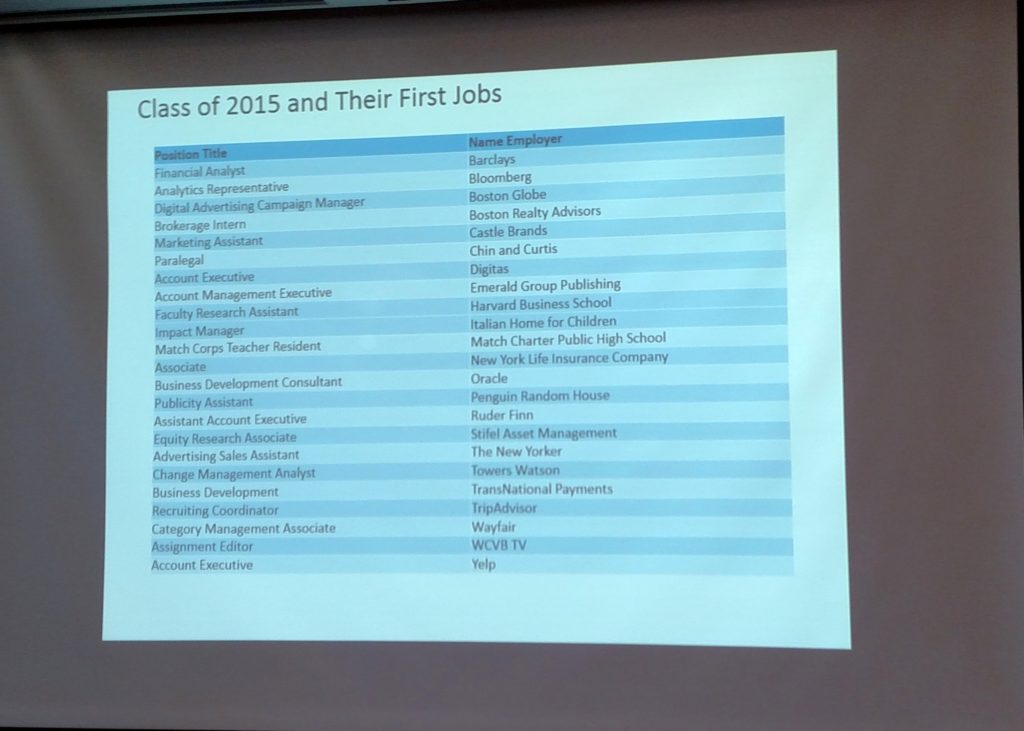What’s a poetry lover to do? Although many students become excited about the liberal arts in high school or even before then, some are reluctant to pursue such studies in college. Between rising tuition and ballooning student loan debt, increasing numbers of students feel like they should pursue more practical, career-related degrees, like business, engineering, or nursing. Often, these students are pressured by their parents, who are paying for college and don’t want to see their kids working at Starbucks and living in Mom and Dad’s basement when they’re 30.
Yet, selecting a major doesn’t have to mean making a choice between doing what you love and living in poverty. The following slide was shown during the parent orientation at Boston College, where my niece (and former client) just started her freshman year:
Parents were asked, “How many of these students were English majors?” The answer might surprise you: all of them were.
For years, I’ve been touting the value of liberal arts education, saying that the liberal arts teach students how to conduct research, think critically, problem-solve, analyze information, and communicate verbally and in writing — skills that are all desirable in today’s job market. Furthermore, I’ve contended that because our economy and technology are evolving so quickly, 10-20 years from now there will be jobs that we cannot even conceptualize today. Having the aforementioned skills will enable people to continue learning throughout their lives, which will be necessary to succeed in a constantly changing world.
If my argument and the examples of a couple dozen Boston College graduates aren’t enough to convince you, there’s plenty of data out there. In a recent Washington Post article, Steven Pearlstein, a professor of public affairs at George Mason University and a business and economics writer for the Post, cited some interesting statistics. In 2011 and 2012, as the U.S. was beginning to recover from the Great Recession, the unemployment rate for recent college graduates with liberal arts and humanities degrees was 8.4%. The lowest unemployment rate was for recent grads who had majored in engineering: 6.5%. That’s less than a 2% difference.
Pearlstein offers equally compelling information about average salaries for people with different majors. He writes, “The top 25 percent of history and English majors earn more than the average major in science and math, while the bottom 25 percent of business majors make less than the average wages of those majoring in government and public policy.”
Remember what I said about how the liberal arts teach skills that are in high demand in today’s workplace? Turns out, I was spot-on. Pearlstein reports that in a 2013 study of 318 employers, 93 percent agreed that “‘demonstrated capacity to think critically, communicate clearly, and solve complex problems is more important than
The September issue of Money magazine contained an article about the 20 liberal arts colleges whose graduates earn the highest salaries. The article reports the average early and mid-career salaries for graduates from each of the colleges. The first school on the list is Harvey Mudd College, which, despite being classified as a liberal arts college by the Carnegie Foundation for the Advancement of Teaching, offers only STEM (science, technology, engineering, and math) degrees. Some might see Harvey Mudd’s#1 status as proof that science and engineering majors earn the most money. However, the number two college, Colgate University, is a traditional liberal arts college, as are 18 of the 20 schools on the list.
Want more data? Google “value of liberal arts education” and you’ll find extensive information on this topic. More importantly, ask yourself or your child these simple questions: What will I/you most enjoy studying? What am I/are you most excited about and motivated to learn about? If the answer is not engineering or business but rather history or philosophy, chances are you/your child will not only learn a heck of a lot but will also be just fine when it comes to getting a job and supporting him or herself. You can go ahead and turn that basement rec room into a home office or craft studio, because junior won’t be needing it.






